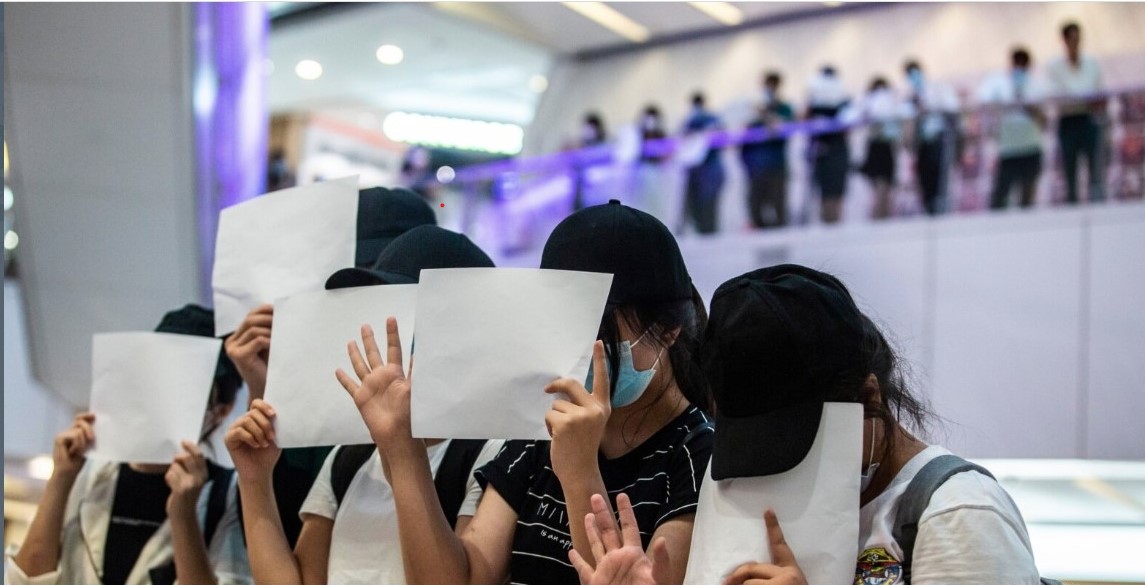LONDON: The Hong Kong Correctional Services Department is using “brainwashing” measures to “deradicalize” jailed pro-democracy protesters there, two former inmates who were activists told VOA Cantonese.
The term “deradicalize” and the tactics are similar to what authorities in China have used in Xinjiang, where 1 million Uyghurs and other mostly Muslim minorities are being held in internment camps.
The Hong Kongers, who are former inmates, told VOA Cantonese that while serving their sentences, authorities forced them to watch video clips praising China as government social workers tried to change their political views.
Beijing cracked down on Hong Kong’s pro-democracy movement in 2020 with the passage of a security law that targeted many of the rights, such as press freedom, that made Hong Kong different from the rest of China.
Rights advocates that VOA Cantonese spoke with said the measures were similar to those used in Xinjiang and were aimed at stopping people from opposing or criticizing the government. The use of these tactics will continue if the international community does not raise concerns, according to the advocates.
Wong Kwok-hing, commissioner of Hong Kong’s Correctional Services Department, said in answers to Hong Kong lawmakers dated April 14, that the department will identify the special needs of each inmate during the deradicalization process and match each inmate with a suitable rehabilitation program in order to help prisoners re-establish correct values to replace “radical thoughts and behaviors.”
The program will match inmates “with appropriate rehabilitation programs based on 3 focused rehabilitation directions, namely understanding Chinese history and national education, psychological reconstruction and re-establishment of values, life planning and rebuilding of family relationships, with a view to setting targets by stage for them to achieve de-radicalization progressively,” according to the answers.
The department said that as of the end of February, 250 inmates have “actively participated in these programs on a voluntary basis” and the reaction has been “positive and favorable,” according to the answers.
The program operates on two tracks: “Youth Lab” for young inmates “to undergo psychological rehabilitation and reconstruction” and the “Psychological Pathway to Change” that provides “personalized therapies” for adult inmates.
VOA Cantonese spoke with two former inmates about their “deradicalization” experiences. Both requested pseudonyms and the use of few personal details due to fear of government retaliation.
Wai Kwan, a former inmate, told VOA Cantonese that they were invited to join the program and joined voluntarily, not knowing that they would have to watch a patriotic video while participating in a career training program while they were in prison.
According to them, the two-hour sessions for adult offenders mainly focused on successful job interview techniques, but during the last 30 minutes, inmates were required to watch No Poverty Land, a 12-episode series made by TVB in 2021 that focuses on Beijing’s poverty alleviation efforts in remote areas of China. TVB is one of the largest free-to-air television companies in Hong Kong. Li Ruigang, the former deputy secretary-general of the Shanghai Municipal Committee of the Chinese Communist Party (CCP), is a major shareholder.
The video had nothing to do with career training, the former inmate said, adding, “the show basically said all those poor people are working so hard to get out of poverty.”
On Sundays, inmates were allowed to watch a movie, but before the main attraction, authorities “would play some clips made by TVB, basically saying how good China is — how advanced the technology is, how convenient their transportation is and how amazing their food is.” The pre-movie videos were 30 to 45 minutes long.
Siu Yu was sentenced because of their participation in social movements and stayed at a rehabilitation center set up by the Correctional Services Department for offenders aged 14 to 21.
“I think it’s brainwashing,” they told VOA Cantonese. “Every morning during breakfast, we would watch these shows about China’s advanced technology. It was on all the time, over and over.”
Social workers assigned to their case questioned them about the pro-democracy movement, they said.
“They were so gossipy, they kept asking me what exactly I had done, whether I ever had weapons, what’s my view on social movement, and if I regret what I’ve done,” they said.
“Sometimes I thought they were just chatting, but (the conversations) always ended with how good life is in (China),” they continued to say.
Luke de Pulford, a human rights activist and the coordinator of the Inter-Parliamentary Alliance on China, said the tactics used in these Hong Kong prisons are very similar to tactics already in use by authorities in China.
“These patterns are scarily familiar,” he told VOA Cantonese via text message. “Threats dressed up as incentives. Brainwashing masquerading as re-education. The tactics of … Xinjiang truly are coming to Hong Kong.
“Back in 2019 when Hong Kongers said the city would become another Xinjiang, they were dismissed,” he added. “Now it is hard to disagree. … Hong Kong is becoming just as intolerant of dissent as anywhere else in Mainland China, and the tactics used to repress that dissent are harder and harder to distinguish from those we associate with the worst of the CCP.”
According to Western researchers, between 1 to 3 million Uyghurs in Xinjiang have been detained in camps, where they receive reeducation and political indoctrination. China said these are career training centers that provide free language, law and career skill lessons for the ethnic Uyghur community.
Patrick Poon, a visiting researcher at Meiji University’s Institute of Comparative Law in Tokyo, agreed that although there’s a difference in the degree of enforcement, the tactics used by Hong Kong authorities are similar to those used in Xinjiang’s reeducation camps. The goal, according to Poon, is to quash any opposition and criticism of the government.
Poon said that the lack of international attention to Beijing’s re-education tactics being used would make the situation worse in Hong Kong.
“I think it’s vital that the international community put more attention on this new development,” he told VOA Cantonese. “It will only get worse without intervention. These tactics will not disappear.” (voanews.com)









Comment